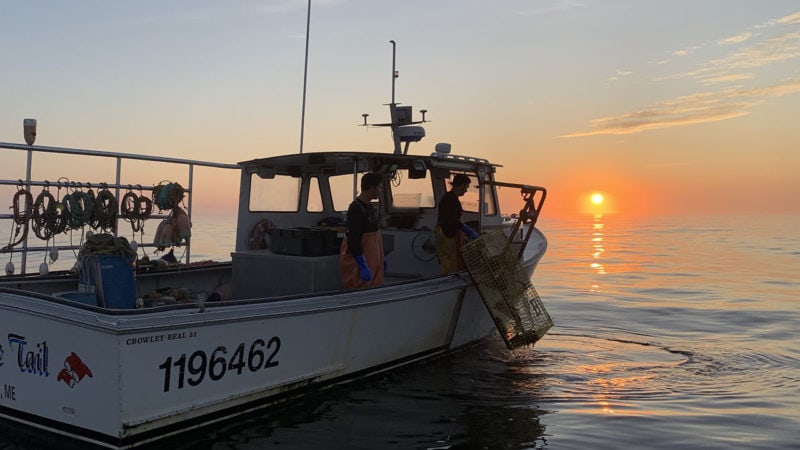Last Updated on January 27, 2025
How do you start a career in lobstering?
Growing up in the coastal Maine town of Cape Elizabeth, just south of Portland, lobstering was not how most kids spent their time. But by ages seven and eight, John and Brendan Ready would rise early, meet their uncle’s pickup waiting on the dirt road leading to their house, and then head out to a nearby cove to lend some needed extra hands. While other kids had paper routes or earned money for baseball cards by doing chores, the Ready boys were getting paid in what Brendan describes as “old, beat-up wooden lobster traps.”
After a few years helping their uncle, they’d acquired and fixed up 20 or 30 traps—as Brendan tells it, “John was really good at fixing things.” By ages 10 and 11, they’d head out on the water in a 13-foot wooden skiff their father got them and haul their own traps.
Today, John and Brendan run Ready Seafood, one of Maine’s largest lobstering operations. At the heart of their business are many of the tried-and-true values that drive the earnest men and women working the land and the sea to bring food to dinner tables each night. For the Ready brothers and the rest of their team, it’s a dedication to family, the call to uphold local traditions and support local workers, and, more than anything, the belief that there is a better, more responsible way to sustain the lobster industry.
Growing Up Lobstering
“We were really spoiled,” Brendan says, “but not in the sense that our family had money, we literally grew up on the ocean.”
“When I was a seven-year-old kid and went out on the boat for the first time with my uncle, I had no idea what I was doing,” he adds. “But sometimes it was just magic. Our backyard was the ocean. Some kids mowed lawns, some kids played soccer, we went lobstering. That was just life.”
After a day of lobstering, the brothers would bring their lobsters up to a local farm stand to sell. But it isn’t the hard-earned money Brendan remembers from his first days on a lobster boat, it was family.
He and John would walk out their door and row out to their skiff which was right in the backyard, or, as most know it, the Atlantic Ocean. “We’d walk down to the beach with our buckets, set out, and haul 20 traps together. We were young kids,” Brenden explains. “When we looked in, we could see our grandmother’s house which was right next to ours. And you could look right in and she’d be in the window all day with her binoculars.”
As they would bring their wagons filled with the day’s haul up from the beach, Brendan recalls that their grandmother would be there to greet them with warm chocolate chip cookies. “In a different sense, we were spoiled,” Brendan says.
When discussing if he’d let his own kids out on a boat at such an early age, Brendan was quick in his response: “We got to go lobstering on our own as 11-year-olds, which is crazy when I think about my kids. They will never do that just because you don’t let a kid out on the boat, at least I wouldn’t think to do that now as a parent.”
“It sounds just out of control, but that was just a lifestyle of a lobsterman.”
Growing a Lobster Business the Maine Way
Today, Ready Lobster, the company founded by John and Brendan, has grown into one of the largest suppliers of lobster in the world. Recently, they opened a multi-million dollar, state-of-the-art lobster processing facility in Saco, Maine—it is now the largest facility devoted to lobster operations in the state of Maine.
But the incredible growth from hauling traps in their “backyard” to their current success was not anything they could have ever imagined. “We never about what we were going to do for a living, there was no real planning. It all just came naturally.”
A key part of the success of the company has been the mission-driven mindset that the business was built upon. “Our mission is to provide our customers, our team members, and the harvesters we work with across the state of Maine with the same opportunities that we had as kids,” says Brendan. “That means access to the best tasting lobster for our customer, but also it means thinking about the future of lobstering in Maine as much as we are catching today.”
For their partners harvesting lobster throughout the massive Gulf of Maine, they want to ensure that there is a future for the industry in the state and that the natural resource doesn’t get depleted. “There’s a camaraderie among the group of 6,000 men and women in the state of Maine who go lobstering. It’s hard work, but they love what they do.”
Brendan and John wanted to make sure the future of lobstering was the same as it was when they were kids. So they brought in Curt Brown for a unique role that was a first for the lobster industry: An in-house marine biologist.
Sustainable Lobstering? “We don’t want to just think about today.”
About six years ago, John and Brendan reached out to Curt to start a conversation about creating a research program at Ready Seafood focused solely on lobster with two main priorities: Quality and sustainability.
The three have known each other since they were kids, and as Curt explains it, “John and Brendan were always more interested in where the lobsters were going after we caught them. I was always much more interested in where the lobsters were coming from under the ocean surface, which led me down the road to the marine biology side of things.”
Since, the company has become the first private company to fund public lobster research, in Brendan’s words, “to improve everyone’s understanding of lobster so that we could better manage the resource.”
“We were the first in our industry to commit to sustainability as a business. We were the first to have an onsite marine biologist. And over the last six years, we’ve developed a research program, collaborating with local universities throughout the state, some of the top lobster scientists in the world,” Curt explains. “I think we’ve opened people’s eyes to the potential of science and industry working together.
So what does sustainability mean in the lobstering industry? “It means leaving more than you take so that ultimately, our kids and the kids of those in the industry can have the same opportunities we’ve had,” says Brendan.
“We see that as our responsibility, as a business, as a big lobster company here in Maine, that started out from very humble beginnings, to ensure that the lobster population is going to be there for the next generation.”
Dennis Keohane is a writer, editor, and former Editorial Director for ButcherBox with a passion for storytelling and food. Combining his love for high-quality ingredients with engaging narratives, he crafts content that inspires home cooks to explore new flavors, techniques, and the joy of cooking.



